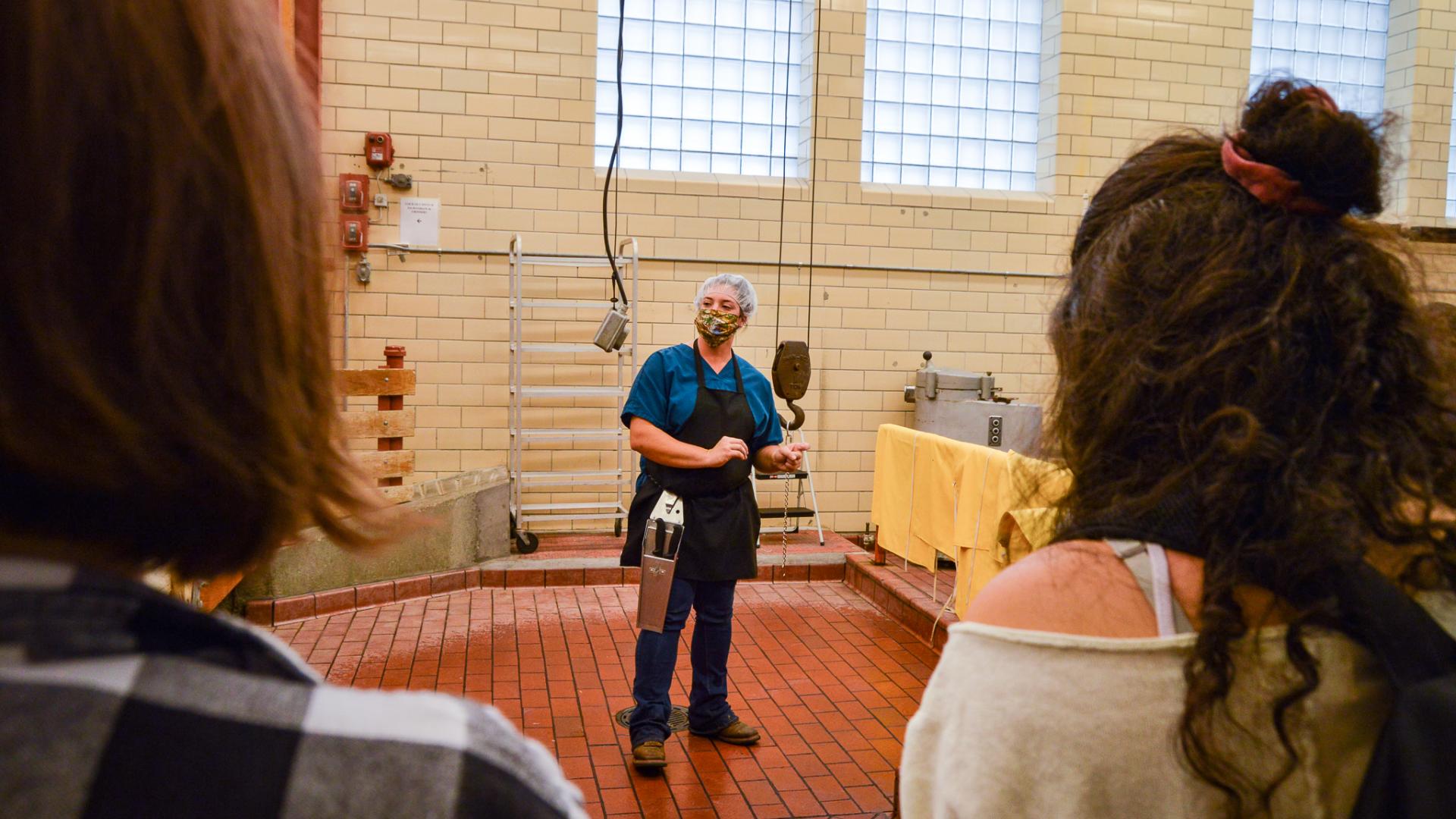Facility manager, Jessica Waltemyer oversees all the facilities for the Department of Animal Science in Cornell’s College of Agriculture and Life Sciences (CALS), including sites used to teach students hands-on methods of raising animals and those for large-scale research. Waltemyer also teaches courses that prepare students to become responsible and ethical leaders in the food processing industry: Meats (ANSC 3500) and Large Animal Handling (ANSC 2100). Here, she discusses her work.
The Meats course is one of the department’s most popular courses. How did the course come to be and what is your current role?
I started out assisting in the course six years ago and now run the entire laboratory portion of the course. For many years, the department maintained a retail meat market that was sourced through the original meat science course. The retail market was discontinued in 1983, and the first meat science course ended in 2008 when the lead professor retired. In 2016 I worked to revive both the lecture and lab components of the course. Given its growing popularity, the course was fully revitalized in 2018 and has been offered every fall semester since. We cap the registration at 16 students per lab section to keep the course small and interactive.
Animal Science does a fantastic job providing in-depth, hands-on experiences for students. I'm proud to add the Meats course to the growing list of experiential learning opportunities!
What is something that makes the Meats course unique?
Our facility is a fully United States Department of Agriculture (USDA) inspected facility, which means the students experience USDA officials inspecting the products for animal welfare and food safety regulation compliance. This certification is crucial for student learning. I worked closely with people in the meat industry and took several courses on food science and safety to earn the certification. By 2019 we had a USDA inspected facility, fully integrated lecture and laboratory course that focused on providing students unique hands-on experiences in meat production. Students learn what it means to be a responsible and ethical member of the food processing industry. All of our labs are done in the presence of USDA officials that oversee our practices and answer any questions students may have.



What hands-on opportunities do students get to have in the laboratory portion of the course?
Our holistic educational approach to teaching students about the food processing industry ensures they leave the course with a well-rounded understanding of the training and techniques needed in this industry. There’s a large emphasis on human safety and animal health, as well as a focus on technical skills, such as the handling of live animals, humane processing techniques, and preparing the carcass for consumption. Our USDA inspection and certification allows us to sell our products to customers, and this provides a great learning opportunity for students to become familiar with the retail side of the industry, including packaging, labeling, and marketing. We want students to be aware of hygienic practices as well as safe techniques for meat cutting.
At the end of the semester, we have a tasting lab that allows students to try different cuts of meat from different species. They get to enjoy the products from their coursework throughout the semester.
What are some things that you enjoy teaching about the course?
I really enjoy providing information to people who have limited exposure to the industry. I emphasize the high degree of safety, regulation, and welfare in order to ensure the safety of the products. I have worked with students from a wide variety of majors who have all found the course immensely rewarding.


Tell us about your course Large Animal Handling.
In 2016, I began pursuing my Master in Professional Studies degree through the Cornell CALS Department of Animal Science to improve my knowledge in food science and animal biology. My final project encompassed the goals and training I wanted to achieve during my MPS, and my focus was on agricultural education. As the animal science facilities manager, I came to realize that there was a need among students to have more experience working with large animals in a safe and comfortable environment. I created the course to achieve these goals and provide hands-on learning experiences for students.
While the class isn’t exclusively focused on food processing, the techniques students learn in the course help them understand how to handle livestock ethically and safely, which ultimately applies to the food supply chain. Most of my students in this course are on the pre-veterinary track, but I always try to convey the importance of their work in the greater context of the food industry.
Catherine Andreadis ’22 is a student writer for the Cornell CALS Department of Animal Science.
Keep Exploring

Field Note
- Dairy Fellows Program
- Animal Science
- Agriculture

News
- Animal Science
- Animals

We openly share valuable knowledge.
Sign up for more insights, discoveries and solutions.


